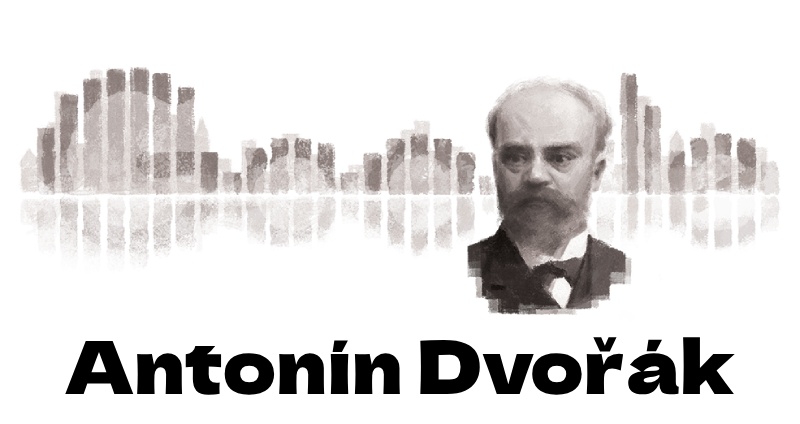Festivals & Events
Interesting Facts about Antonín Dvořák, a Czech Composer and Musician

Today’s Google Doodle honors Czech composer and musician Antonín Dvořák, who will be remembered on September 8, 2023. He was born on September 8, 1841, in Nelahozeves, north of Prague. Here are a few interesting and fun facts about Antonín Dvořák.
Here is a look at the life and work of Antonín Dvořák.
Who was Antonín Dvořák?
Quick Look
- Birth date: September 8, 1841,
- Birthplace: Nelahozeves, Bohemia, Austrian Empire [now in Czech Republic]
- Died on: May 1, 1904 (aged 62)
- Death place: Prague Czech Republic
- Notable Works: cantata, American Quartet, Cello Concerto in B Minor, Op. 104, Gypsy Melodies, Op. 55, Moravian Duets, New World Symphony, Slavonic Dances, Stabat Mater, Symphony No. 7 in D Minor
- Movement / Style:
- Romanticism
- nationalistic music
- Also Known As: Antonín Leopold Dvořák
Interesting Facts about Antonín Dvořák
- Born in Nelahozeves, Bohemia, Austrian Empire (now the Czech Republic), on September 8, 1841, Antonín Dvořák, full name Antonín Leopold Dvořák, was the first Bohemian composer to receive widespread acclaim. He is renowned for fusing folk music with 19th-century romantic music.
- In Nelahozeves, a Bohemian (now Czech) village on the Vltava River north of Prague, Antonín Dvořák was born as the first of nine children.
- He first became familiar with music while growing up in and around his father’s inn, and as a young child, he developed into a skilled violinist who contributed to the amateur music-making that accompanied the local couples’ dances.
- The youngster had an unmistakable ability for music, which was noticed and fostered, despite the fact that it was anticipated that he would become a butcher and innkeeper like his father (who also played the zither).
- Antonín Dvořák went to live with an aunt and uncle in Zlonice when he was about 12 years old and started learning harmony, piano, and organ.
- During his three years in Zlonice, he composed his early works, polkas.
- An astute music teacher convinced young Antonín Dvořák’s father to enroll him at the Institute for Church Music in Prague in 1857 after realizing that he had outgrown his own limited teaching abilities.
- Antonín Dvořák took a two-year course there, played the viola in several inns and with theater bands, and supplemented his little income with a few private students.
- Dvořák struggled during the 1860s because he lacked the time and resources to compose, including paper and a piano.
- In subsequent years, Antonín Dvořák said to have little recollection of the work he produced at the time, yet in 1864, his desk included two symphonies, an opera, chamber music, and a number of unheard songs.
- His prior preferences for the music of Ludwig van Beethoven and Franz Schubert were becoming more and more tinted with the influence of Richard Wagner and Franz Liszt, as seen by the diverse works of this time.
- The sisters Josefina and Anna Čermáková were among the pupils Antonín Dvořák taught throughout the 1860s.
- Josefina, the older sister, was the object of the musician’s devotion, but she didn’t feel the same way. According to legend, Cypresses (1865), a collection of songs with poems by Gustav Pfleger-Moravský, expresses the pain of his unfulfilled love.
- Antonín Dvořák married Anna, the pianist and singer’s younger sister, in November 1873. The Dvořáks’ early years of marriage were fraught with financial uncertainty and sorrow. By 1876, Anna had given birth to three children, all of whom she had buried by 1877.
- But she gave birth to the first of the couple’s six healthy children in 1878, who they would raise together.
- Josefina and Count Václav Kounic, whom she later married, were close friends of the Dvořáks.
- They began spending every summer there after purchasing a vacation home in the tiny village of Vysoká, where Josefina and the count had made their home after several years of frequent visits. There, Dvořák wrote some of his best-known compositions.
- Following his receipt of a state grant from the Austrian government in 1875, Antonín Dvořák met Johannes Brahms, with whom he developed a meaningful friendship.
- Dvořák first gained international recognition for himself and his native music with the publication of the Slavonic Dances for piano duet and the Moravian Duets for soprano and contralto by Fritz Simrock, who was introduced to him by Brahms. Brahms also provided him with useful technical advice and introduced him to a powerful publisher.
- Antonín Dvořák’s name continued to grow overseas thanks to the respect of the top critics, musicians, and conductors of the day, which inevitably resulted in even larger successes at home.
- He made his first of ten trips to England in 1884. Only the Stabat Mater (1877) and Te Deum (1892) now rank among the best compositions of their kind, but their success, particularly that of his choral works, gave him great pride.
- Antonín Dvořák experienced a personal triumph in 1890 when his friend Pyotr Ilyich Tchaikovsky organized two performances for him in Moscow. He received an honorary doctorate in music from the University of Cambridge the following year.
- In 1892, Dvořák accepted the position of director of the National Conservatory of Music, which had just opened in New York. During his time there, he visited as far west as Iowa.
- Despite finding much in the New World environment to fascinate and stimulate him, he soon began to regret his home country, and in 1895 he went back to Bohemia.
- Antonín Dvořák wrote several string quartets, symphonic poems, and his final three operas in the latter years of his life.
- The foundations of the Czech nationalist movement in music had already been formed by Bedřich Smetana, who was Antonín Dvořák’s older by 17 years, but it was left to Dvořák to develop and extend this in an astonishing series of works that immediately ranked in popularity with those of his great German contemporaries.
- The excellent melody-making ability of Antonín Dvořák and the pleasantly modern Czech nature of his work, which provided a welcome counterpoint to some of his contemporaries’ heavier fare, are the main reasons for his appeal.
- Technical mastery and an abundance of melodic inspiration enabled Antonín Dvořák was to produce a significant and diversified body of work.
- With the probable exception of opera, he wrote in all musical genres and left behind pieces that are recognized as classics in every one of them.
- Only the somber Symphony No. 7 in D Minor (1885) is as successful in its symphonic structure as it is musically. All of Antonín Dvořák’s mature symphonies are of outstanding caliber. (It should be noted that despite the fact that Dvořák wrote four earlier [and unnumbered] symphonies, his mature symphonies were long regarded as No. 1 to 5.
- Since then, the numbers for all nine of his symphonies have been changed to reflect the actual order in which they were composed.)
- Antonín Dvořák’s chamber music is also of the highest caliber, despite the fact that his work in the genre occasionally exhibits excessive strain.
- One of the masterpieces of chamber music is the Piano Quintet in A Major (1887), while other masterpieces include the String Sextet, Opus 48 (1878), the Dumky Trio, Opus 90 (1891), and the string quartets Opuses 51 (1879), 105 (1895), and 106 (1895).
- The choral works, which were so well-liked when they first appeared, have met the same fate as the majority of choral music from the late 19th century, while the Te Deum (1892) and Stabat Mater (1877) are two of the genre’s best examples.
- Despite writing 10 operas, including the famous Rusalka (1900), Dvořák’s creativity continued to be tested by the one genre that refused to accept his works.
- The Slavonic Dances (1878, 1886) and other piano duets, the Symphonic Variations (1877), the Bagatelles (1878), the Gypsy Songs (1880), and the Scherzo Capriccioso (1883) are some of Dvořák’s most beautiful compositions.
- After spending around three years in America, Antonín Dvořák returned to Prague and took over as the conservatory’s director, passing on his expertise to upcoming composers from the Czech Republic.
- His attention shifted to operas in his later years, and in 1901 he debuted Rusalka, a musical fairytale that has enjoyed a century of global acclaim.
- Antonín Dvořák is regarded as one of the first Czech composers to achieve international renown and is best known for his romantic music infused with folk influences.
- On September 8, 2023, Google featured a Google Doodle on its homepage for Antonín Dvořák’s 182nd Birthday.
-
Health3 weeks ago
Back to Roots: Ayurveda Offers Natural Cure for Common Hair Woes
-

 Tech4 weeks ago
Tech4 weeks agoFrom Soil to Silicon: The Rise of Agriculture AI and Drone Innovations in 2025
-

 Science1 week ago
Science1 week agoJuly Full Moon 2025: Everything You Should Need to Know, When and Where to See Buck Moon
-

 Sports3 weeks ago
Sports3 weeks agoFIBA 3×3 World Cup 2025: Full Schedule, Preview, and How to Watch
-

 Gadget4 weeks ago
Gadget4 weeks agoThings to Know about Samsung Galaxy S26: What’s New and What’s Next
-

 Tech4 weeks ago
Tech4 weeks agoAdobe Firefly App Now Available on iOS and Android Phones to Create AI Images and Videos Anywhere
-

 Sports2 weeks ago
Sports2 weeks agoPrefontaine Classic 2025: Full Schedule, Preview, Field, Events and How to Watch Diamond League Eugene Live
-

 Apps3 weeks ago
Apps3 weeks agoWhat’s New Features Coming to Apple Music App in iOS 26



















